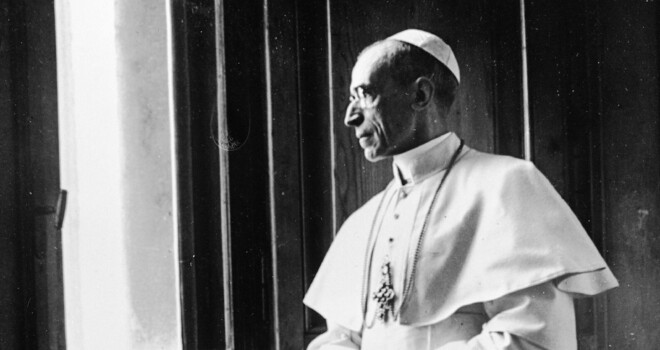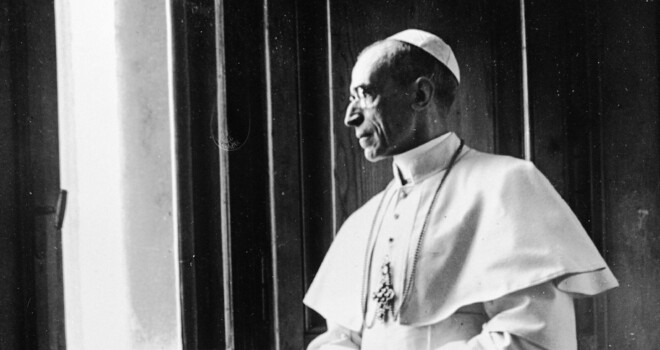Good books are like a vein of precious metal or perhaps a deposit of a useful mineral. The miner may find extraction either easy or labor-intensive. The Pope’s Cabinet by Johan Ickx definitely falls into the latter category. This valuable book (subtitled Pius XII’s Secret War for Saving Jews) adds to our knowledge about the Pope, the Church, and the Jews during World War Two, but getting to that knowledge is the equivalent of deep-shaft mining rather than panning for easy-to-find gold nuggets.
Catholicism’s attitudes and actions towards the Jewish people have long been debated both within and outside the Church. Pope John Paul II was adamant in seeking close relations with “our elder brothers” and spoke movingly of his childhood friendship with a Jewish boy. But Pius XII (Papa Pacelli) has long been an especial target of vitriol for what some perceive as his inaction towards Jews under threat of Nazi extermination. The most notorious attack on Pope Pacelli came from John Cornwell and his malicious Hitler’s Pope. Later, the Cold War was the platform for Communist efforts to discredit Pope and Church. And within the past year Irish novelist Joseph O’Connor published the first of three novels set in wartime Rome, My Father’s House, which depicts the Pope as an aloof, uncaring, pro-German monster. (Pius XII had served as a diplomat in Germany, spoke fluent German, and had a German nun as his head house-keeper. He was also the main author of Mit Brennender Sorge, the papal encyclical issued by Pius XI in 1937 that infuriated the Nazis.)
Readers expecting more tales of derring-do ala The Scarlet and the Black or The Pope’s Jews by Gordon Thomas may be disappointed by The Pope’s Cabinet. While the 2022 book by Vatican archivist Ickx is short—though not completely lacking—in adventure, it fulfills an important and complementary role by revealing the behind the scenes activities of the Pope and his Vatican staff. This book offers hope by giving just a small glimpse at the extent of Vatican efforts to save Jews. Ickx suggests that there are mountains of more corroborating documentary evidence yet to be published, which may finally put to rest the pernicious slanders of Pius XII and the Church.
Before getting into topical content, we should consider the book’s linguistic challenges. Diplomacy and its grammar seem foreign to our age of hyperbolic social media exchanges. Diplomatic language is rarely straightforward, preferring code and allusion and traditional signals to declaration and emotion-laden words. Protocols and custom are highly regarded, even required. Ickx relies heavily on diplomatic records, and that fact alone can test the patience of the reader on this subject who is used to the exploits of Monsignor Hugh O’Flaherty, not opaque correspondence between the Vatican and its diplomats. The attentive reader may also occasionally stumble over not-quite-idiomatic English (due to translation?). A notable example is the repeated use of the word “informer,” which in standard English has a pejorative connotation of traitorous action. This book uses it to denote someone providing information. There is also a selection of diplomatic terms which are unfamiliar to the non-specialist reader; however, these are defined in a lexicon in the back of the book.
Besides a new acquaintance with the workings of diplomacy and diplomats, readers stand to gain insights into a number of topics. One is the issue of baptism and Faith. One method used to save Jews was the administration of baptism, thus securing the rights of the Church in the lives of individuals under threat from anti-Semitic governments. This book illustrates the controversy over baptism both within the Church (are individuals only receiving baptism in order to escape tyranny?) and without (Jews remain Jews despite baptism). But the issue was bigger than that. Many individuals seeking help were practicing Catholics of Jewish descent but trapped by anti-Jewish laws and definitions. Again and again Vatican officials used official channels to try to help, but often those efforts stalled or failed or were rendered moot by events on the ground. Latter-day critics should remember that trying and failing or being stymied is a far cry from indifference. The Pope’s Cabinet shows the limitations and the strengths of official channels.
Another eye-opening issue is the fact of Catholic involvement in unsavory politics, such as in Slovakia and Vichy France. Given the reality of Original Sin, this should not surprise us, even if it saddens us. Ickx is not convinced Pius XII in any way shared those shortcomings, and even makes a case that the Pope’s views on “the Jewish Question” was influential on the Vatican II document Nostra Aetate calling for greater religious understanding and tolerance.
Ickx uses a structure for the book he says is modeled after Bocaccio’s Decameron. I did not find that structure particularly convincing or helpful. The chapters vary in length and content. Some are heavy in the diplomacy content but some are more personal stories. There are also frustratingly incomplete stories due to the lack of documentary evidence. We do get short biographies of the major Vatican characters, though surprisingly not any straightforward picture of the Pope himself. Although he is ostensibly the book’s protagonist, Pius XII is here a shadowy figure. Also, Ickx never really delineates the Pope’s cabinet in its organization. But what is revealed is the Pope’s steadfast neutrality during the war. Readers from nations fighting against the Nazis might forget that the Pope was not “on our side” during the war. The Church was neutral and the Vatican City State strove to maintain its neutral status even as it helped Jews and soldiers to hide or escape. The Nazis tested the Church’s resolve by occasionally invading its extraterritorial places. Ickx does a good job of capturing both diplomatic nuances and protocol and the activity on the ground during those Nazi incursions. (See especially chapter 15, A Tale of Secret Hiding Places.”) On the other hand, Allied diplomats tried to find ways to get Church help or at least endorsement, but Pius was too seasoned a diplomat to fall for those efforts.
Sadly, anti-Semitism did not die with the demise of Naziism or the end of Fr. Coughlin’s radio shows. This book is a cogent reminder of the positive role the Catholic Church—its bureaucracy and hierarchy—have played in combating the longstanding irrational hatred of the Jewish people. Johan Ickx has taken the documentary evidence and started piecing together stories which need telling. One such story is about the courageous, if often hidden, leadership of Pius XII in protecting the persecuted. “No one lives a perfect life…but we all deserve to be remembered in truth,” writes Ickx (p.9). That remembering is a worthy endeavor and a noble project. I think those who go to work with Ickx in this book will agree.
The Pope’s Cabinet: Pius XII’s Secret War to Save the Jews is available from Sophia Institute Press.
Image: Pope Pius XII, Fair Use













